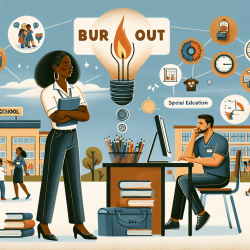Burnout among school social workers is an increasingly prevalent issue, driven by high caseloads, emotional demands, and often limited resources. This is especially true for those working within special education, where the needs of students can be particularly complex and multifaceted. However, recent research offers valuable insights and strategies that can help mitigate these challenges and promote well-being.
In this blog, we will delve into the latest research-driven strategies to combat burnout, ensuring that school social workers can continue to provide essential support to students while maintaining their own health and well-being.
Understanding Burnout
Burnout is a state of emotional, physical, and mental exhaustion caused by prolonged stress. It is characterized by three main dimensions:
- Emotional Exhaustion: Feeling drained and overwhelmed by work demands.
- Depersonalization: Developing a detached and impersonal response to students and colleagues.
- Reduced Personal Accomplishment: Experiencing a sense of inefficacy and lack of achievement.
Research-Driven Strategies to Combat Burnout
Here are several evidence-based strategies that can help school social workers manage and reduce burnout:
1. Self-Care and Mindfulness
Self-care practices are crucial for maintaining mental health and preventing burnout. Research highlights the effectiveness of mindfulness techniques, such as meditation and deep-breathing exercises, in reducing stress and enhancing emotional regulation. Regularly engaging in these practices can help social workers maintain a balanced and positive outlook.
2. Professional Development and Training
Ongoing professional development can provide school social workers with new skills and knowledge, increasing their confidence and competence. Training in areas such as trauma-informed care, crisis intervention, and telepractice can be particularly beneficial. For those interested in telepractice jobs, understanding the nuances of online therapy can open new opportunities and reduce the burden of in-person sessions.
3. Support Networks
Building a strong support network is essential. This can include regular supervision, peer support groups, and mentorship programs. Research shows that social workers who have access to supportive colleagues and supervisors report lower levels of burnout. Networking opportunities, such as conferences and webinars, can also provide valuable connections and resources.
4. Organizational Interventions
Schools and districts can play a significant role in preventing burnout by implementing organizational interventions. These may include:
- Reasonable Caseloads: Ensuring that social workers are not overwhelmed by excessive caseloads.
- Flexible Scheduling: Allowing for flexible work hours and the possibility of remote work.
- Access to Resources: Providing necessary resources and tools to effectively perform their duties.
Implementing Change
Implementing these strategies requires a collaborative effort between social workers, school administrators, and policymakers. It is essential to advocate for systemic changes that support the well-being of school social workers and recognize the critical role they play in the educational system.
At TinyEYE, we are committed to supporting school social workers through our online therapy services. Our platform offers a flexible and effective way to deliver special education services, reducing the burden on in-person staff and helping to address therapist staffing shortages. By leveraging telepractice, we aim to create a more sustainable and supportive environment for all educational professionals.
Conclusion
Burnout is a significant challenge for school social workers, but it is not insurmountable. By adopting research-driven strategies and fostering a supportive work environment, we can help social workers thrive and continue to make a positive impact on the lives of students. Together, we can build a more resilient and effective educational system.
For more information on how TinyEYE can support your school, visit our website or contact us today.










